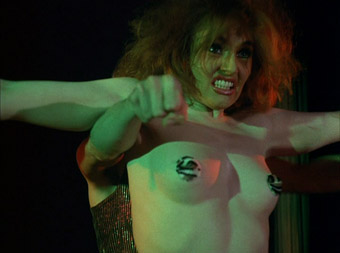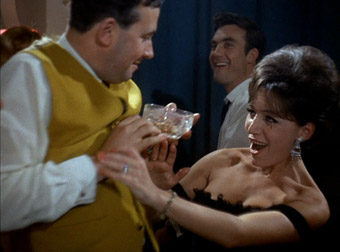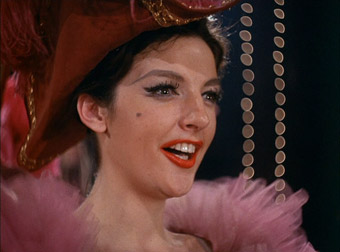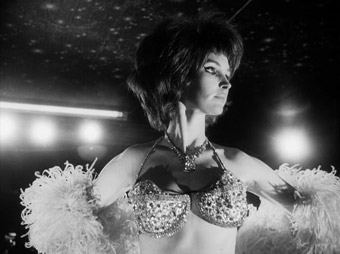|
Directed by Arnold Louis Miller and produced and photographed by Stanley A. Long, Primitive London plays very much as a companion piece to the same team's earlier London in the Raw, a reading encouraged by the BFI's simultaneous release of both on DVD and Blu-ray as part of its new Flipside strand. Any doubt about this should be quashed by the news that Primitive London was originally planned as London in the Raw II. Stylistically they're like twin brothers who work in adjacent departments at the same company – both have the same look, pace, setting and BBC English voice-over, and they share a similar fondness for almost random location hopping. The differences are largely down to specific content and some small but notable shifts in the handling of individual scenes.
After a brief ponder on sentimentality and birth, there's an initial but deceiving sense of structural purpose, as the teenage group ethic is explored through a dip into the world of the beatnik, a label largely rejected by the young interviewees. Quite where the filmmakers stand on their lifestyle is uncertain, with some of the questioning seemingly designed to provoke contemporary audience disapproval (asked if he has a job, a would-be poet provides an unapologetically negative response), but from a modern perspective they come across as energetic, likeable and rather fun.

But just as you think you have an idea where the film is going, it's off on its travels, and in a break from the style of the earlier film – and the rest of this one if the truth be told – the advertising industry is satirised in a dramatised sequence that at first appears to be about its own construction, as a director and editor argue on the soundtrack about its content, which is briefly broken up by the latter's creative editing decisions. It's a setup intermittently revisited to watch a producer – who looks uncannily like Barry Cryer – prompt a thespian presenter to go increasingly overboard with his delivery of the ad's tagline.
And in the blink of an eye we're looking at Judo for women, which we are told will be used to strong-arm husbands into paying for a new dress, then on to Kendo and the competitive nature of the modern world, which somewhat mysteriously leads us to the St. James Hatters and the modern preference for the Derby over the traditional Bowler. In no time at all we're at the hairdressing salon (hats, hair, it's all about heads), where we're assured that "When a woman wants something, she usually gets it." How about some respect and equality of treatment by the narrator? Just a thought.
As the film progresses, the links between the subjects covered become increasingly difficult to even spot, let alone swallow. Some nightclub nudity and bodybuilder muscle-rippling leads us to all-in wrestling and then to knights in armour, after which our cheerfully sexist host informs us that "women just don't go in for personal combat, except in beauty contests, of course." Oh, the dears. Then we're off to the tattooist (where the concept of women getting tattoos is "presenting a problem for psychiatry"), then a Turkish bath and its English equivalent, which is being used by shapely young ladies to shrink their jeans to fit. The film does take a brief breather to look down its nose at rockers, another teenage group whose behaviour fails to meet with our narrator's approval, with their "over-emphasis on masculinity" and apparently aimless assertiveness. I thought they seemed rather fun. Once again, questions are asked in order to shore up the common view of these ruffians, one of whom takes the bait by openly admitting that he's not big on book reading.

The location and subject jumping continues as road death statistics lead to a re-enactment of Jack the Ripper's first murder and the not-too-subtle suggestion that there's a modern equivalent at large in London today. By the time we get to stand-up comedians and key parties,* the narrator is sounding more and more like the sort of sniffy moralist who these days would be writing a column on the ills of modern society for The Daily Mail. It's here that I became most aware of the film's often negative view of changing times, with nostalgic phrases like "Parties used to be given for people to meet and talk to one another" and "There was a time when a comedian's stock-in-trade was a loveable personality" popping up with increasing regularity. By this point, the scene switching has become completely random and often bemusing, as we go from ten-pin bowling to a goldfish getting surgery, to a lengthy look at the plight of battery chickens, all on what feels like a cinematic dice roll. This does at least keep you on your toes, as you'd have to be psychic to have a clue where the film will go next – seriously, who could possibly predict it would jump from a piece on a striptease school graduate to one on scalpel-assisted corn removal? As the end approaches you just know we're coming back to that key party, which our moral guardian lays into with undisguised contempt for the participants, informing us that "life must look sick to anyone willing to compromise it in this fashion" and describing them all as "true delinquents." And then we're back to gawk at a nudie stage show.
All of which may make Primitive London sound archaic and even a little ludicrous, but my sarcasm is tinged with real affection and tempered by the understanding that this is very much a film of its time, and that its record of these little pockets of London life, and even the views expressed, are a valuable and interesting document of the place and period. Like it's predecessor, it moves at a lick and cheerfully mixes obviously staged material with authentic-looking documentary footage, and it never looks less than ravishing, shot as it was on 35mm, with every scene lit with the care of a dramatic feature. And I have a feeling that amusing potential in a drinking game based on pausing the film at specific points and taking bets on just where the hell it will go next.
Like its predecessor, Primitive London has been gloriously restored for this re-release and even the upscaled DVD looks utterly gorgeous – I've yet to clock the Blu-ray equivalent but can't see it beating this by a huge margin. Colour, contrast and detail are superb throughout and serve to remind you just how much nicer properly transferred 35mm still looks the best digital video equivalent. There is some minor flickering in places and the odd spot of dust, but in all other respects this is a cracking job.
UPDATE: Having now seen the Blu-ray edition I stand by the above. As with London in the Raw, the detail is crisper but not by the sort of margin you'll find on some simultaneous DVD and Blu-ray releases. That's not a criticism of the Blu-ray, but a testament to how good the DVD is. Again, the film grain is more evident on the BD transfer, but the fine detail of textures and complex patterns and objects is also crisper. On either format its richness, colour and sharpness are a treat.

The mono soundtrack is no more nor less than you would expect, being clear of damage and serious distortion but inevitably narrow in its dynamic range. All of which somehow suits the film rather well. As with London in the Raw, the soundtrack on the Blu-ray is identical to the DVD.
Included here are three of three hundred and thirty self-financed interviews with celebrities and public that were conducted by Bernard Braden and his wife Barbara Kelly between 1967 and 1968 for a proposed TV series that never actually materialised to be called Now and Then. There are no formal introductions or captions, and we're left to work out just what the interviewees do for a living from their responses to the questions asked. The extras are also in HD, which actually makes little difference with the interviews, which are a tad soft and display visible film grain.
Al Burnett interview (1967) [16:24]
Cigar-smoking veteran nightclub owner Al Burnett talks about how his business has changed over the years, and engagingly reveals how clubs previously bypassed the licensing laws. He also suggests a grim future for the industry unless the Conservative Party is returned to power and reverses the various new laws that he claims are squeezing his profits. The condition of the print is very good, and there's only a sprinkling of dust here and there.
Stuart McCabe Interview (1968) [14:41]
McCabe appears to have been the owner or manager of a strip club with a bit more class than the local competition, something perhaps deliberately reflected in his unexpectedly upper-middle class accent. He comes across as savvy and level-headed about his business, and expresses admiration for the high standard of British pornography. That said, his story of the surprise he experienced at the sight of the girl shooting up in the middle of a crowded tube train made me wonder if, just maybe, what he'd actually witnessed was a diabetic self-administering an insulin shot. Again, the interview is in fine condition.
Shirley Interview (1968) [6:03]
A London striptease artiste talks about her life and work and the public perception of Soho in an accent that suggests a background similar to McCabe's, but which momentarily but tellingly slips when she says "an hour and a half," suggesting this is her interview voice rather than how she normally speaks.

Carousella (1965) [25:19]
An interesting and impressively crafted documentary portrait of a group of London striptease girls, constructed from the period favourite mixture of vérité footage, staged material, audio interview, and deadpan narration. Their on-stage performances gets a little more coverage than is needed to get the point across, but balance is provided by welcome glimpses of the girls at home or conversing in the dressing room. The Who even make a brief on-stage appearance, but don't look down for a second or you'll miss them. It's a film that should be of particular interest to British cinema enthusiasts, being an early work of director John Irvin, he of The Dogs of War (1980) and Hamburger Hill (1987), and whose partner in the production company Mithras Films was Tim Miller, who went on to become Senior Tutor and Course Director in Film at the Royal College of Art and co-writer of The Warrior (2001) with graduate and director Asif Kapadia. The print is in very good shape, with excellent contrast and detail and solid black levels. There's grain visible, but it suits the style of the film well enough. The HD version on the Blu-ray disc looks every bit as good, but with even sharper detail.
The Trailer (1:53) has a rescued-from-a-cupboard look about it and does the job without reaching the sensationalist heights of the one for London in the Raw. More's the pity.
Finally we have another splendid BFI Booklet that includes a Guardian essay on the film by Iain Sinclair, less colourful but more informative pieces by Vic Pratt and William Fowler, the brief and hostile original Monthly Film Bulletin review, biographies of Arnold Louis Miller and Stanley A. Long, retrospective notes on the film by Long, recollections of Carousella by John Irvin and Tim Miller, the more favourable MFB review of Carousella, an article on Bernard Braden's Now and Then interviews by James Piers Taylor, notes on the French translation of the narration by Elise Pineda, credits for both films, transfer details and stills.
Another stonking restoration of a film that few will even have heard of, let alone seen, this again comes with some neat supplementary material and an excellent booklet. Having now seen the DVD and the Blu-ray there's surprisingly little in it, though the Blu-ray just has the edge on sharpness and detail, as it should. The film alone might have been a risky recommendation, but once again it's the extras that help make either disc worthwhile.
* For those of you too young or morally uptight to have heard of these, they were a much talked about adjunct to wife-swapping, where the husband's car keys (men drove, you see, not women) were placed in a bowl, and at the end of the evening the women would pick one out and nip off home with their owner. It's been credited with breaking up quite a few marriages in its time.
|